【人教版】2017版新目标英语九年级Unit2期末复习教学案(Word版)
期末Units1-2复习教案-人教版九年级英语全册

三、短语快译
9.查阅;抬头看
14.取决于;依靠,依赖
……感兴趣16.注意;关注
……和……连接或联系起来
19.写下;记下20.找出;发现;弄清楚
21.紧张的;有压力的22.逐渐地;一点点地
23.代替;而不是24.增加(体重);发胖
25.与……相似26.忘却;洗净
5.无论是谁喝了这个(药)都会长生不老。
教
学
反
思
7. chemistry化学n.→adj.化学的→
8. warmth温暖;暖和n.→adj.温暖的9.active活跃的;积极的adj.→n.活动10.wisely明智地,聪明地adv.→adj.聪明的→n.智慧11.stranger陌生人n.→adj.陌生的1ห้องสมุดไป่ตู้.tradition传统n.→adj.传统的13.dead死的;失去生命的;→n.死,死亡→v.死,死亡
九年级Units 1—2
学 科
英语
年 级
九年级
主备教师
授课教师
课 型
复习课
课 时
第一课时
课 题
九年级Units 1—2
教材分析
本节课带领学生一起复习九年级Units 1—2 的单词、短语及重要句型,掌握单词的各种词性变化,能用情景交际的句子进行对话。
教学目标
1.Units 1—2 的单词、短语及重要句型。
16.款待;招待n.请(客);招待v.17.增加;增长v.
18.圣诞节n.19.速度n.20.存在;平躺;处于v.21.搭档;同伴n.22.(长篇)小说n.23.能力;才能n.24.生意;商业n.25.大脑n.26回顾;复习v.27.警告;告诫v28.知识;学问n.29.现在;礼物n.现在的adj.30.传播;展开v.;蔓延;传播n.
人教新目标英语九年级Unit2语法复习教案
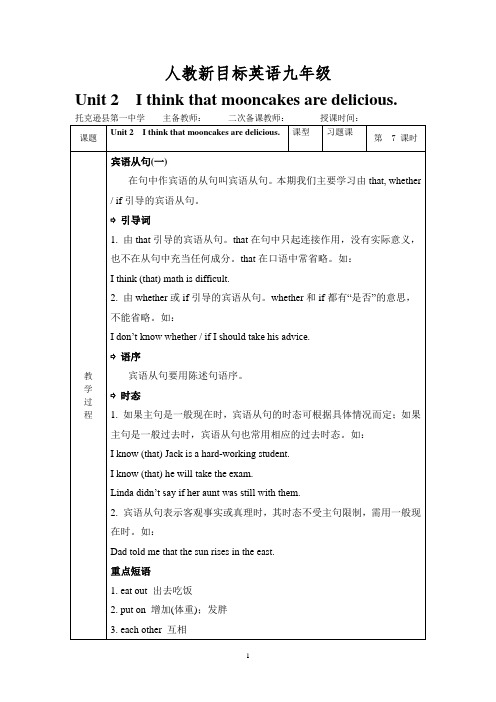
2.宾语从句表示客观事实或真理时,其时态不受主句限制,需用一般现在时。如:
Dad told me that the sun rises in the east.
重点短语
1. eat out出去吃饭
2. put on增加(体重);发胖
人教新目标英语九年级
Unit 2I think that mooncakes are delicious.
托克逊县第一中学 主备教师: 二次备课教师: 授课时间:
课题
Unit 2I think that mooncakes are delicious.
课型
习题课
第 7 课时
教
学
过
程
宾语从句(一)
在句中作宾语的从句叫。
3. each other互相
4. shoot down射落
5. call out叫出
6. lay out摆开;布置
7. as a result结果
8. play a trick on sb.捉弄某人
9. end up最终成为;最后处于
10. remind ... of提醒;使想起
重点句子和对话
1. —What do you like best about the Dragon Boat Festival?
⇨语序
宾语从句要用陈述句语序。
⇨时态
1.如果主句是一般现在时,宾语从句的时态可根据具体情况而定;如果主句是一般过去时,宾语从句也常用相应的过去时态。如:
I know (that) Jack is a hard-working student.
九年级英语(Unit 2)教案 人教新目标版 教案

辽宁省丹东七中九年级英语《Unit 2》教案人教新目标版教学目标:1.知识目标:词汇: Key Vocabularyused to, dark be afraid of句型: Target LanguageMario used to be short.Yes, he did. Now he's tall.2. 能力目标:本课学习谈论过去的外表、性格特征和兴趣爱好以及目前的状态。
3. 情感态度Don't judge a person by his appearance.教学重点1.Target language2.The structure: used to教学难点The structure: used to教学准备: tape recorder pictures教学方法:情景操练,反复使用,师生互动,生生互动。
教学过程:Teaching of new lesson1、Ask the students to describle people’s appearane.appearanetall, short, thin, heavy, fat, medium, height, good-looking, straight, hair curly blonde hair, a medium build, glasses, sunglasses, sports shoes2、Ask the students to describe people’s personality.personality outgoing, easygoing, serious, funny, moody, friendly, unfriendly, shy, generous, smart3、Then the teacher shows some photos of himself (herself) taken years ago and says to the students.I used to be short I used to have straight hairI used to wear glasses I was outgoing4、Ask the students to work in pairs with the words above.A: Did you use to be short ?B: Yes, I didA: Did you use to have straight hair ?B: Yes, I didA: Did you use to wear glasses ?B: Yes I didA: Were you outgoing ?B: Yes, I did5、Ask the students to talk to each other with the following sentences pattens.Did you use to be …? Did you use to have … ? Did you use to wear … ?6、Make a dialogue. You haven’t seen your classmates for several years. Now you met in the street and talked to each other with the following words.7、教学2aAsk students: What are they doing? Say: You will hear a boy and a girl talking to each other ata party, some people surely changed a lot. Listen and check the words you hear.8、教学Grammar Focus写一些句子在黑板上:You used to be short. He used to play tennis. Did you use to be short ? Did he use to have long hair ?说明used to用于陈述句而Did…use to 用于一般疑问句。
九年级英语 Book 9Unit 2 I used to be afraid of the dark复习导学案 人教新目标版
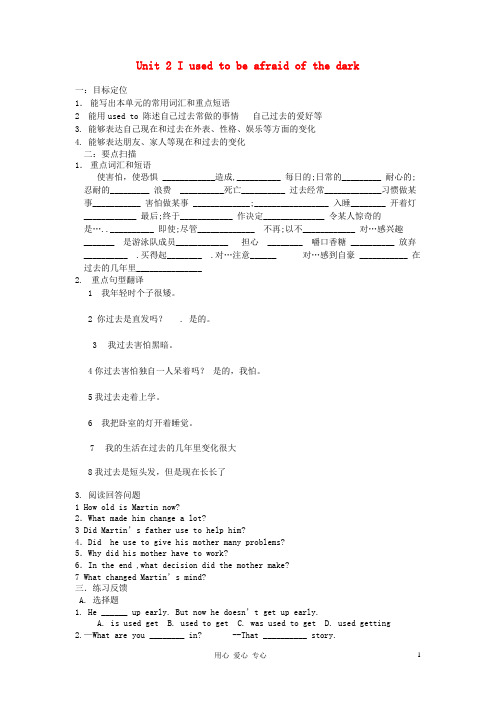
Unit 2 I used to be afraid of the dark一:目标定位1.能写出本单元的常用词汇和重点短语2 能用used to 陈述自己过去常做的事情自己过去的爱好等3. 能够表达自己现在和过去在外表、性格、娱乐等方面的变化4. 能够表达朋友、家人等现在和过去的变化二:要点扫描1.重点词汇和短语使害怕,使恐惧 ____________造成,__________ 每日的;日常的_________ 耐心的;忍耐的_________ 浪费 __________死亡__________ 过去经常_____________习惯做某事___________ 害怕做某事 _____________;_________________ 入睡________ 开着灯____________ 最后;终于____________ 作决定______________ 令某人惊奇的是…..__________ 即使;尽管_____________ 不再;以不____________ 对…感兴趣_______ 是游泳队成员____________ 担心________ 嚼口香糖 __________ 放弃__________ .买得起________ .对…注意______ 对…感到自豪 ___________ 在过去的几年里_______________2.重点句型翻译1 我年轻时个子很矮。
2 你过去是直发吗? . 是的。
3我过去害怕黑暗。
4你过去害怕独自一人呆着吗?是的,我怕。
5我过去走着上学。
6 我把卧室的灯开着睡觉。
7我的生活在过去的几年里变化很大8我过去是短头发,但是现在长长了3. 阅读回答问题1 How old is Martin now?2.What made him change a lot?3 Did Martin’s father use to help him?4.Did he use to give his mother many problems?5.Why did his mother have to work?6.In the end ,what decision did the mother make?7 What changed Martin’s mind?三.练习反馈A. 选择题1. He ______ up early. But now he doesn’t get up early.A. is used getB. used to getC. was used to getD. used getting2.—What are you ________ in? --That __________ story.A. interesting, interestingB. interested, interestingC. interested, interestedD. interesting, interested3.--Are you afraid of ____at home, Linda? --No, I've grown up.A. aloneB. being aloneC. lonelyD. being lonely4 .It _______ that he has been ill for a long time.A. seemsB. looksC. looks as ifD. seems as if5. ___________ study in No.4 Middle School?A. Did you used toB. Did you use toC. Do you used toD. Do you use to6.. The old man is ________, but he doesn’t feel ____________.A. lonely; aloneB. lonely; lonelyC. alone ; lonelyD. alone; alone7.—What ________ the forest of the USA in the last 350 years?A. has happened toB. is happened toC. has happened atD. is happening8 .I often _________ an hour in the morning reading English.A. takeB. spendC. costD. pay9._______ our surprise, he didn't pass the Eng exam.A. InB. WithC. By D To10.You used to be quiet, _______ you?A. used B .did C didn't D are11. . Don’t ___________ about things so much. It will make you stressed out.A. afraidB. terrifyC. terrifiedD. worry12. Time lost will never return ___________.A. no moreB. some moreC. any moreD. no longer13 --Why are you so tired these days? --Well, I have _________ work to do.A. so muchB. so manyC. so fewD. so little14. –Do you often see her? –No, she lives in Spain, so I _________ see her.A. oftenB. hardlyC. alwaysD. ever15.—Why do you look unhappy? --Well, my mother is on business in Beijing . I_____her. A. leave B. think C. see D. miss16 _______ you remember me, I’m Dania ,your childhood friend?A. don’tB. Don’tC. Do notD. do notB完成句子1.她现在仍然害怕在众人面前说话。
英语人教版九年级全册Unit 2复习课

Unit 2复习课教学设计知识与技能:1、复习第二单元的单mooncake lantern folk garden admire ghosttradition等2、会用这个句型来委婉的向别人提出请求或要:Could you please……?学会使用感叹句过程与方法:小组合作,练习情感态度价值观:要学会尊敬师长,要守时,时常关心他人。
教学过程:Step 1 Lead in.教师播放歌曲,学生边唱边引入新课。
Step 2教师播放PPT,让学生看汉语,翻译出英语单词或短语。
Step 3给学生几分钟时间来记忆这些单词或短语。
Step 4 对重点单词或短语进行语法讲解。
1、增加(体重); 发胖 put on2、与……相似 be similar to3、摆开; 布置 lay out4、打扮; 装扮; 穿上盛装 dress up5、捉弄某人; 开某人玩笑 play a trick on sb6、最终成为; 最后处于 end upStep 5句型攻关。
复习宾语从句。
一、宾语从句的连接词:1、连词that,只起连接作用,在从句中不作句子成分,也无词汇意义,在口语中常被省略。
eg. He knew (that) he should work hard.2、连词if 、whether,它们起连接作用,在从句中不作句子成分,作“是否”解,在口语中多用if。
eg. Tom don’t know if/whether his grandpa liked the present.He asked me whether or not I was coming.3、连接代词who, whom, whose, what, which,连接副词when, where, why, how,它们起连接作用,作句子成分,各有自己的意义。
eg. The teacher asked the new students which class he was in.I wonder where he got so much money.【注意】1、由连接代、副词引导的宾语从句可以和“疑问词+不定式”结构转化。
人教新目标九年级英语全册Unit 2 The 2nd Period教案人教新目标版

精品基础教育教学资料,请参考使用,祝你取得好成绩!Unit 2 I used to be afraid of the dark.The Second PeriodDate:Ⅰ. Teaching Aims and Demands1. Knowledge Objects(1)Key Vocabularybe interested in, sure(2)Target LanguageI used to be really quiet,I know. Now you’re very outgoing.Did you use to have straight hair?Yes, I did.Did you use to play the piano?No, I didn’t.2. Ability Objects(1) Train students’ listening skill.(2) Train students’ integrating skills.3. Moral ObjectYou should have the courage of your opinions.Ⅱ. Teaching Key Points1. I used to be really quiet.I know. Now you are very outgoing.2. Did you use to have straight hair?Yes, I did.3. Did you use to play the piano?No, I didn’t.Ⅲ. Teaching Difficult Points1. Yes/No questions with used to2. Statements with used toⅣ. Teaching Methods1. Teaching by explanation2. PairworkⅤ. Teaching Aids1. Pictures of people cut out from magazines or newspapers2. A tape recorderⅥ. Teaching ProceduresStep Ⅰ RevisionCheck homework. Ask a student to hold up the picture given to him yesterday or a picture he/she collected himself/herself to the class. Then let him/her read out his/her article about the person in the picture.Step Ⅱ 2aThis activity provides listening practice using the target language. Point to the picture and ask students what is happening. Elicit answers from students.T: Where do you think they are?Ss: They are in a family room.T: What are they doing?Ss: They are having a party.Point to the six words in the box and ask students to repeat each one. Make sure students know the meaning of each word.Say, You will hear a boy and a girl talking to each other at a party. Listen to the recording and check the words you hear they say. Point out the sample answer.Play the recording for the first time.Students only listen.Play the recording a second time. This time ask students to put a check in front of the words they hear.Check the answers.AnswersChecked words: quiet, outgoing, friendlyTapescriptGirl 1: Hey. Steve! Over here! Don’t you rem ember me?Boy 1: Oh, wow! You’re Paula, aren’t you?Girl 1: That’s right.Boy 1: But you used to be really quiet, didn’t you?Girl1: Yeah, I wasn’t very outgoing.Boy l: No, you weren’t. But you were always friendly. Wait a minute. Did you use to play the piano?Girl 1: Yes, I did. But now I’m more interested in sports. I play soccer and I’m on the swim team.Boy 1: Wow! People surely change.Culture noteMany houses in the United States have a family room. The family room is where families relax. Watch TV, play games, and listen to music every day. It is a very informal room. Most families use the family room more often than the other rooms. Step Ⅲ 2bThis activity gives students practice understanding the target language in spokenConversation.Ask students to point to the blank lines in the conversation. Say, You will write one word on each blank line.Read the conversation aloud saying blank when coming to a blank line.Play the recording. Students fill in the blanks with the words they hear.Correct the answers. Read the conversation aloud, filling in the missing words.Students check their answers.Answersquiet outgoing friendly sportsStep Ⅳ 2cThis activity provides oral practice using the target language. Focus students on the conversation in Activity 2b. Ask a pair of students to read it to the class.SA: Hey, Steve! Over here! Don’t you remember me?SB: Oh, wow! You’re Paula, aren’t you?SA: That’s right.SB: You used to be really quiet, didn’t you?SA: Yeah, I wasn’t very outgoing.SB: No, you weren’t. But you were always friendly. Wait a minute. Did you use to play the piano?SA: Yes, I did. But now I’m more interested in sports. I play soccer and I’m on the swim team.SB: Wow! People surely Change.Point to the sample conversation. Get another pair of students to read it to the class.SC :I used to be really quiet.SD: I know. Now you’re very outgoing.Say, Now work with a partner. Start by reading the conversations in Activities 2b and 2c. Then make conversations about yourselves.Have students work in pairs. Move around the room listening in on various pairs and offering help if necessary.Check the answers by calling on different pairs to say their conversations to the class. Note: Answers will vary.Sample answersA: I used to play the piano.B: I know. Now you’re busy with your subjects.Step Ⅴ Grammar FocusAsk different students to say the statements and the questions and answers.S1:I wasn’t very outgoing.S2: You used to have long hair.S3: Did you use to have straight hair?S4: Yes, I did.S3: Did you use to play the piano?S4: No, I didn’t.Write them on the blackboard. Ask a student to circle the words used to, use to, did and d idn’t. The following are noteworthy:1. When we write statements, we use the words used to.2. When we write questions, we use the words did + use to.3. When we answer a question with used to, we use did or didn’t.Dictate the following for further understanding:1. You used to be short.2. He used to play soccer.3. Did you use to draw pictures?Yes. I did.4. Did she use to have long hair?No, she didn’t.Pronunciation noteEnglish speakers usually pronounce the words used to and use to exactly the same way. They run the words together and pronounce these words as if they were spelled ustuh.say the statements and questions and answers in the grammar box to demonstrate this pronunciation. Get students to repeat several times using the ustuh.Step Ⅵ SummarySay, In this class, we’ve mainly learned the "use to" questions and "used to" statements.Step Ⅶ HomeworkAsk students to write a short report about what a favorite film star or a famous scientist was like when he/she was a child. Suggest students to add pictures to their written work.Step Ⅷ Blackboard DesignTeaching Postscript:。
人教版新目标英语九年级Unit 2教学设计(5课时)
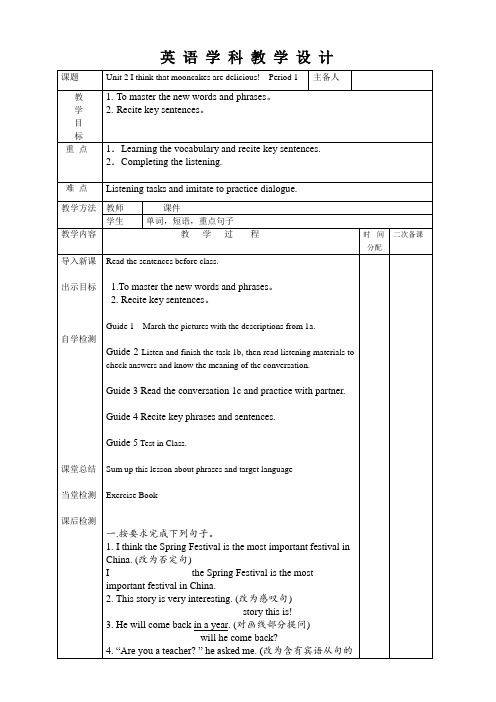
Unit 2 I think that mooncakes are delicious! Period 1 主备人
1. To master the new words and phrases。 2. Recite key sentences。
1.Learning the vocabulary and recite key sentences. 2.Completing the listening.
Unit 2 I think that mooncakes are delicious! Period 1
板书设计
(Section A 1a-1c)
教学反思
课题 教 学 目 标 重点 难点
教学方法
教学内容 导入新课
当堂检测 Exercise Book
课后检测
一.按要求完成下列句子。 1. I think the Spring Festival is the most important festival in China. (改为否定句) I________ ________the Spring Festival is the most important festival in China. 2. This story is very interesting. (改为感叹句)
子合并成含宾语从句的复合句。 6. Mooncakes are delicious. (I think. . . ) _________________________________________________ 7. Will they have zongzi again next year? (Bill wonders. . . ) _________________________________________________ 8. Mike will come to their party next weekend. (They believe. . . ) _________________________________________________ 9. China will become the strongest country in the world by 2035. (We are sure. . . ) _________________________________________________ 10. Were the dragon boat races interesting? (She asks me. . . ) _________________________________________________
新目标英语九年级unit2教案新目标-人教新目标版九年级全册
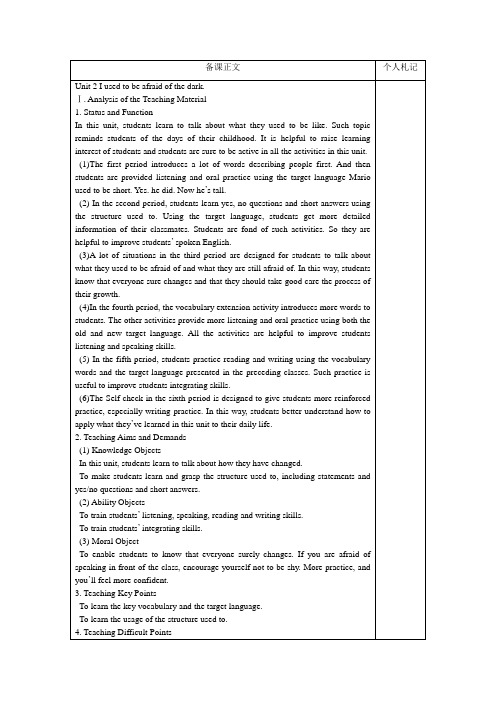
3.Moral Object
Don’t judge a person by his appearance.
Ⅱ.Teaching Key Points
1. Target language
2. The structure: used to
Ⅲ. Teaching Difficult Point
The structure: used to
(5) In the fifth period, students practice reading and writing using the vocabulary words and the target language presented in the preceding classes. Such practice is useful to improve students integrating skills.
(2) Ability Objects
To train students’listening, speaking, reading and writing skills.
To train students’integrating skills.
英语人教版九年级全册第二单元复习课导学案
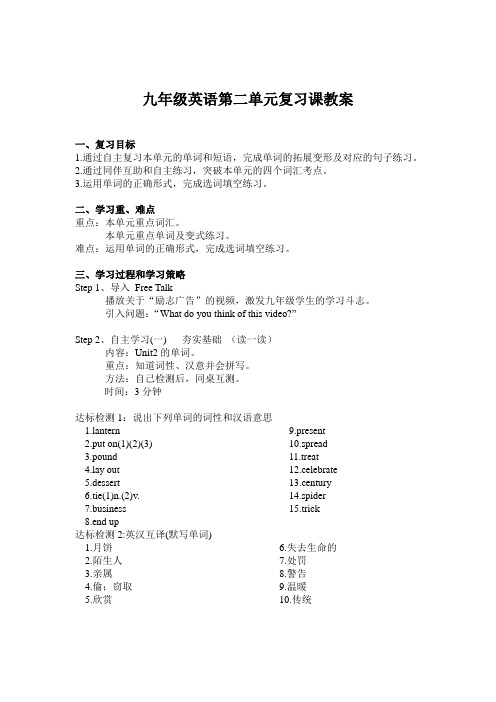
九年级英语第二单元复习课教案一、复习目标1.通过自主复习本单元的单词和短语,完成单词的拓展变形及对应的句子练习。
2.通过同伴互助和自主练习,突破本单元的四个词汇考点。
3.运用单词的正确形式,完成选词填空练习。
二、学习重、难点重点:本单元重点词汇。
本单元重点单词及变式练习。
难点:运用单词的正确形式,完成选词填空练习。
三、学习过程和学习策略Step 1、导入Free Talk播放关于“励志广告”的视频,激发九年级学生的学习斗志。
引入问题:“What do you think of this video?”Step 2、自主学习(一) 夯实基础(读一读)内容:Unit2的单词。
重点:知道词性、汉意并会拼写。
方法:自己检测后,同桌互测。
时间:3分钟达标检测1:说出下列单词的词性和汉语意思ntern2.put on(1)(2)(3)3.poundy out5.dessert6.tie(1)n.(2)v.7.business8.end up 9.present10.spread11.treat12.celebrate13.century14.spider15.trick达标检测2:英汉互译(默写单词)1.月饼________2.陌生人_________3.亲属________4.偷;窃取_________5.欣赏________6.失去生命的________7.处罚_________8.警告_______9.温暖________10.传统___________达标检测3:单词变形记:1.stranger-_______(adj)2.steal-______(过去式)_______(过去分词)3.warm-______(n.)4.tradition-___________(adj)5.busy-_________(n.)6.happy-________(n.)7.警告某人不做某事_________________练习达标4:请用词的适当形式完成下列句子。
人教版新目标九年级英语Unit2第二单元全单元教案教学设计
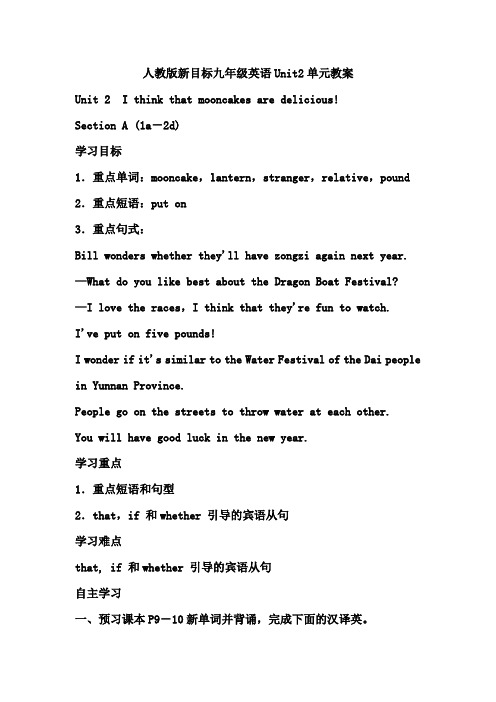
人教版新目标九年级英语Unit2单元教案Unit 2 I think that mooncakes are delicious!Section A (1a-2d)学习目标1.重点单词:mooncake,lantern,stranger,relative,pound 2.重点短语:put on3.重点句式:Bill wonders whether they'll have zongzi again next year. —What do you like best about the Dragon Boat Festival?—I love the races,I think that they're fun to watch.I've put on five pounds!I wonder if it's similar to the Water Festival of the Dai people in Yunnan Province.People go on the streets to throw water at each other.You will have good luck in the new year.学习重点1.重点短语和句型2.that,if 和whether 引导的宾语从句学习难点that, if 和whether 引导的宾语从句自主学习一、预习课本P9-10新单词并背诵,完成下面的汉译英。
1.月饼________ 2.灯笼________3.陌生人________ 4.亲戚________5.磅________二、认真预习1a-2d内容找出下列短语和句型。
1.增加__________________________________________________________ ______________2.Bill 想知道明年他们是否还能吃粽子。
九年级英语期末复习教学案-Unit 2

九年级英语期末复习教学案(三)一. 复习内容:9A Unit 2 Colour二. 教学课时:3教时三. 重点、难点:Comic Strips1. I’d rather wear blue than pink. 我宁愿穿蓝色也不愿穿粉红色。
would rather… than… 表示“宁愿…而不愿…”,“更愿意…”;rather后跟动词原形。
e.g. I’d rather play tennis than swim.He’d rather stay at home than go ou t on such a rainy day.2. There’s nothing wrong with pink, you know.你是知道的,粉红色本身没有错。
nothing 是不定代词,它通常放在所修饰的形容词之前。
类似的不定代词还有something/somebody; anything/anybody; nobody/nothing/no one 等。
There is nothing/ something wrong with sb./ sth. 表示某人/某个东西没出/出了毛病。
e.g. There is something wrong with my watch It doesn’t work.以上句子也可以用以下方式表示: Nothing is wrong with pink.3. But blue looks good on you. 但蓝色穿在你身上看上去很好看。
look good 看上去好看的, on you 表示“穿在你身上” 的意思。
Reading1. Do you know anything interesting about colours? 你知道关于颜色的一些有趣的事情吗? anything interesting 一些有趣的事情, anything 是不定代词,形容词interesting要放在它的后面。
九年级英语全册 Unit 2 复习教案 (新版)人教新目标版.doc

Unit 2教学目标知识与技能:熟练的掌握并与从句的结构,能正确运用感叹句过程与方法:通过不同习题练习,让学生加深对语法知识的掌握;了解国外习俗情感态度价值观:通过本单元的学习,了解我国的传统习俗和国外的风俗,拓宽学生的生活视眼。
教学重难点认知并掌握宾语从句和感叹句的结构宾语从句和简单句的区别教学方法通过听说练习和习题训练学习方法对话练习,听力训练,习题检测巩固教学准备习题,录音,ppt教学过程设计意图Step 1. Review the whole words and phrasesStudents read these words and spell them,then dictate some important expressions,and use phrases to make sentences.Step 2. Grammar focusObjective Clauses:在复合句中,宾语由一个句子充当的,这个句子叫宾语从句。
陈述句中关联词用that; 一般疑问句中关联词用if /whether; 特殊疑问句中关联词用what/who/where/how/when/why等。
E.g. I think that mooncakes are delicious.Exclamation: How+adj./adv.+O+ V How delicious the mooncakes are!What+adj.+n.+O+V What delicious the mooncakes they are!Step3. Exercise1.以……的形状____________ 2.传统的民间故事________3.击落__________4.大喊______ 5.布置________ 6.结果__________7.它们承载着人们对他们所爱和思念着的家人的祝愿。
______________________________8.嫦娥拒绝把药给他并且把它都喝下了。
新目标九年级Unit 2复习教案
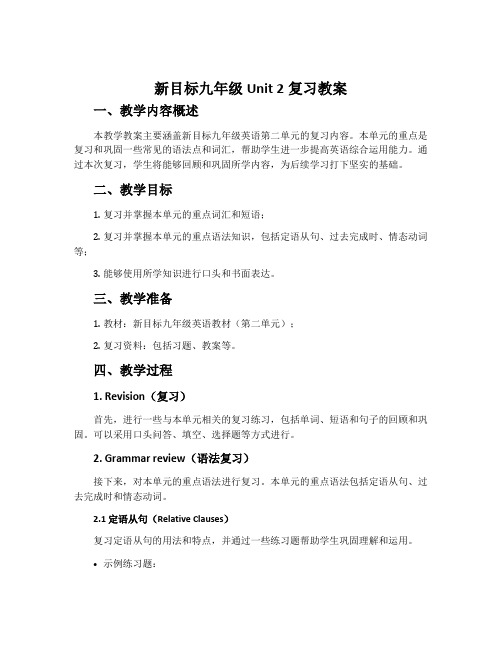
新目标九年级Unit 2复习教案一、教学内容概述本教学教案主要涵盖新目标九年级英语第二单元的复习内容。
本单元的重点是复习和巩固一些常见的语法点和词汇,帮助学生进一步提高英语综合运用能力。
通过本次复习,学生将能够回顾和巩固所学内容,为后续学习打下坚实的基础。
二、教学目标1.复习并掌握本单元的重点词汇和短语;2.复习并掌握本单元的重点语法知识,包括定语从句、过去完成时、情态动词等;3.能够使用所学知识进行口头和书面表达。
三、教学准备1.教材:新目标九年级英语教材(第二单元);2.复习资料:包括习题、教案等。
四、教学过程1. Revision(复习)首先,进行一些与本单元相关的复习练习,包括单词、短语和句子的回顾和巩固。
可以采用口头问答、填空、选择题等方式进行。
2. Grammar review(语法复习)接下来,对本单元的重点语法进行复习。
本单元的重点语法包括定语从句、过去完成时和情态动词。
2.1 定语从句(Relative Clauses)复习定语从句的用法和特点,并通过一些练习题帮助学生巩固理解和运用。
•示例练习题:1.That is the boy ______ father works in the hospital.2.Do you know the man ______ car was stolen?3.The book ______ cover is red is mine.4.This is the song ______ I like best.2.2 过去完成时(Past Perfect Tense)复习过去完成时的结构和用法,并通过一些练习题帮助学生巩固理解和运用。
•示例练习题:1.By the time I got home, my mom _______ dinner.2.They _______ the movie before it started.3.When I arrived, they _______ already _______ for an hour.2.3 情态动词(Modal verbs)复习情态动词的用法和特点,并通过一些练习题帮助学生巩固理解和运用。
人教版英语九年级全册Unit2教学设计

3.学生分享完毕后,教师总结并引入本节课的主题——Unit 2 “My future”。
(二)讲授新知(500字)
1.教师呈现本节课的核心词汇和句型,如:destiny, ambition, career, achievement等,以及一般将来时的表达方式。
2.重点:词汇的积累与运用,特别是与职业、理想相关的词汇。
难点:帮助学生记忆并正确使用这些词汇,提高语言表达的准确性和丰富性。
3.重点:培养学生的阅读理解能力,使其能够从文章中获取关键信息。
难点:指导学生掌握阅读策略,提高阅读效率,形成良好的阅读习惯。
(二)教学设想
1.针对一般将来时的教学,设想如下:
4.针对情感态度与价值观的培养,设想如下:
-创设开放、包容的课堂氛围,鼓励学生表达自己的观点,培养自信心。
-引导学生从文章中汲取正能量,树立正确的价值观。
-组织课堂分享活动,让学生一)导入新课(500字)
1.教师通过播放一段关于未来职业的短片,引导学生关注与职业规划相关的话题,激发学生的学习兴趣。
4.与同学组成小组,讨论并制定一份关于未来职业规划的调查问卷。问卷需包含至少5个问题,并于下节课分享问卷及调查结果。
5.搜集有关职业规划的名言或故事,下节课与同学分享,激发大家对未来规划的思考。
6.观看一部与职业、梦想相关的英文电影或纪录片,记录下感受最深的片段和原因,下节课进行课堂分享。
作业布置要求:
2.小组成员用一般将来时分享自己的职业规划,并提出实现目标的途径。
3.各小组选代表汇报讨论成果,教师进行点评和指导。
人教新目标英语九年级Unit2期末复习学案(英语教案)

unit2复习教案Learning aims:1.Get students to go over useful words and expressions in unit2.2. Enable the students to master the important language points .3.Develop the students ability to use the important language points.Learning Important points:Enable the students to review and use the important language points .Learning Difficult points:Get the students to turn what they have learned into their abilities.Learning procedures:step Ⅰ Check upHave a dictation about some useful words in unit 2.step ⅡSelf—learningRevision the following expressions1.The Water Festival 泼水节2.The Dragon Boat Festival端午节3.Chinese Spring Festival 春节4. The Lantern Festival 元宵节5. go to Macao for the vacation.去澳门度假6. visit one’s relatives 拜访亲戚7.put on 增加(体重)发胖8. That sounds like fun听起来好像有趣9.that’s true 确实10.be similar to 和…相似11. throw water at each other互相泼水12. wash away 洗掉13. celebrate Mid-Autumn Festival 庆祝中秋15.fly up to 飞往16.Mooncakes are in the shape of a full moon 月饼是满月的形状17. traditional folk stories传统民间故事18.the story of Chang’e is the most touching嫦娥的故事最令人感动19. shoot down 射下20.live forever 长生不老21. refuse to do sth 拒绝干某事22.fly up to the moon 飞到月亮(上)23. call out sb 呼叫某人24. plan to do sth 计划做某事25. lay out布置,摆开26. come back 回来27. the tradition of admiring the moon 赏月的传统28. the tradition of sharing mooncakes 分享月饼的传统29. admire the mo on 赏月30. two special days 两个特殊的日子31. Father’s Day 父亲节32. common gifts 普通的礼物stepⅢ Explanation and summary1.Get the students to master the following language points.1)be worth doing sth 值得做某事2)carry Sth to +地点名词把某物搬到…… carry Sth for sb 为某人拿某物3)plan to do sth 计划做某事4)punish sb for 因为……惩罚某人5)end up doing sth 以……结束最终成为…… end up with 以……结束6)warn sb to do sth 提醒某人做某事7)expect sb to do sth 期待(希望)某人做某事8)remind sb of sth 使某人想起事9)promise to do sth 答应做某事许诺做某事10)fail to do sth 未能做某事没有做某事11) agree with sb 同意某人(意见)agr ee to sth 同意(接受)某事agree on sth赞同对方意见agree to do sth 同意做某事12)used to do sth 过去常常做某事be used to do sth 被用于做某事be used for doing sth 被用于做某事be used to doing sth 习惯于做某事13) refuse to do sth 拒绝做某事2.Have the students review the following sentences:1)I know that the Water Festival is really fun. 我知道泼水节真的很好玩。
人教新目标九年级英语全册教案:Unit 2 教案

教学设计Unit2 Section B (2a-2e)课题Unit2 Section B (2a-2e)教学目标1. Lean and master 5 key words; 4 key structures; learn to describe Christmas with the key structures.2. To be able to describe festivals in order and correctly.3. Know something interesting about Christmas.StepⅠDesigning thecontext.1. Greeting﹠Revision2.Show learning aims. StepⅡ. Stepping intonew materials2a-2b2a: What do you know about Christmas? Discuss in groups and create a mind map. 1. Greet the class as usual.2.Revision: Students try to tell something about Halloween, and then finish the exercises on the screen.3.Teacher: We know some Chinese traditional festivals. However, do you know about western festivals, such as Halloween, Easter and so on? Who can tell us anything about them?... And today, we’ll learn about a popular western festival, Christmas.( Teacher writes down the title and show learning aims)1.Teacher shows pictures of Christmas trees, gifts and other thing about Christmas. Students try to say something according to them. Guide students to draw a mind map.eg: Christmas is on December 25th.People get together on that day.People usually have a big meal.People give gifts to each other. etc.2.sing a Christmas song Jingle Bell.2bRead the passage about Christmas and answer the questions first.1.What are the commonthings that peoplethink of forChristmas?2.Who wrote AChristmas Carol?3.What is the truemeaning ofChristmas?2c:Read the passage again and complete the chart.2d:1. Why does Scrooge hate Christmas?2. Does Scrooge have a lot of friends? Why or why not?3. Why was Jacob Marley punished after he died?4. Does Marley want to help Scrooge? How do you know?5. How does Scrooge feel when he wakes up on Christmas Day?6. What does Scrooge do after seeing the three ghosts? 2bStudents read the passage about Christmas and answer the questions first. Answer:1. Christmas gifts, Christmas trees and Santa Claus.2. Charles Dickens.3. / The importance of sharing and giving love and joy to people around us. / To treat everyone with kindness and warmth, spread love and joy everywhere he goes.Point out the key words and structures to get students to read out and understand well.Students read the passage again and try to answer the following questions. Maybe some answers need to be inferred.1.Because just cares about whether he can make more money.2.No. Because he is mean and only thinks about himself.3.He used to be just like Scrooge.4.Yes. He wants Scrooge to change his ways if he doesn’t want toend up like him.5.Scared.6.He decides to change his life and promises to be a better man.StepⅢBringing forth new ideas.2e Discussion: What do youthink of the three ghosts say to Scrooge when they visit him? Discuss it in groups of four and make a conversation in front of the class.StepⅣPutting into practice2c-2dKey words and structures.1. Many would agree that when we think of Christmas, we probably think of gifts, Christmas trees and Santa Claus.2. A Christmas Carol is a famous short novel Free talk practice.Teacher guides students to discuss about the festival and try to make conversations. Help them to use the information in the materials, including the date, the activities, reason and the meaning.Key structures and sentences:Many would agree that when we think of Christmas, we probably think of gifts, Christmas trees and Santa Claus.本句为主从复合句。
人教新目标英语九年级Unit2期末复习学案

objectiபைடு நூலகம்es
To talk about the festivals you like best. To learn to use objective clauses with that, if and whether. (I know/wonder/believe…)
每年冬天, 哈尔滨都有冰灯展。
版权所有-
Do you know these festivals?
Halloween
Dragon Boat Festival
版权所有-
Lantern Festival
Mid-Autumn Festival
版权所有-
Whatdo doyou youlike likebest bestabout about What theWater Chinese Spring Festival? the Festival?
II don’t love like the food. the Water I think Festival. that I think theythat are delicious. getting wet is terrible.
1. Wu Ming and Harry are cousins/ strangers/ friends. 2. Wu Ming went to Singapore/ Hong Kong/ Macao for his vacation. 3. Wu Ming visited his relatives/ friends/ classmates. 4. Wu Ming liked eating out/ shopping/ the Dragon Boat Festival best.
- 1、下载文档前请自行甄别文档内容的完整性,平台不提供额外的编辑、内容补充、找答案等附加服务。
- 2、"仅部分预览"的文档,不可在线预览部分如存在完整性等问题,可反馈申请退款(可完整预览的文档不适用该条件!)。
- 3、如文档侵犯您的权益,请联系客服反馈,我们会尽快为您处理(人工客服工作时间:9:00-18:30)。
【人教版】2017版新目标英语九年级Unit2期末复习教学案
Learning aims:
1.Get students to go over useful words and expressions in unit
2.
2. Enable the students to master the important language points .
3.Develop the students ability to use the important language points.
Learning Important points:
Enable the students to review and use the important language points .
Learning Difficult points:
Get the students to turn what they have learned into their abilities.
Learning procedures:
step Ⅰ Check up
Have a dictation about some useful words in unit 2.
step ⅡSelf—learning
Revision the following expressions
1.The Water Festival 泼水节
2.The Dragon Boat Festival端午节
3.Chinese Spring Festival 春节
4. The Lantern Festival 元宵节
5. go to Macao for the vacation.去澳门度假
6. visit one’s relatives 拜访亲戚
7.put on 增加(体重)发胖8. That sounds like fun听起来好像有趣
9.that’s true 确实10.be similar to 和…相似
11. throw water at each other互相泼水12. wash away 洗掉
13. celebrate Mid-Autumn Festival 庆祝中秋15.fly up to 飞往
16.Mooncakes are in the shape of a full moon 月饼是满月的形状
17. traditional folk stories传统民间故事
18.the story of Chang’e is the most touching嫦娥的故事最令人感动19. shoot down 射下20.live forever 长生不老21. refuse to do sth 拒绝干某事
22.fly up to the moon 飞到月亮(上)23. call out sb 呼叫某人
24. plan to do sth 计划做某事25. lay out布置,摆开26. come back 回来
27. the tradition of admiring the moon 赏月的传统28. the tradition of sharing mooncakes 分享月饼的传统29. admire the mo on 赏月30. two special days 两个特殊的日子31. Father’s Day 父亲节32. common gifts 普通的礼物
stepⅢ Explanation and summary
1.Get the students to master the following language points.
1)be worth doing sth 值得做某事
2)carry Sth to +地点名词把某物搬到…… carry Sth for sb 为某人拿某物
3)plan to do sth 计划做某事4)punish sb for 因为……惩罚某人
5)end up doing sth 以……结束最终成为…… end up with 以……结束
6)warn sb to do sth 提醒某人做某事
7)expect sb to do sth 期待(希望)某人做某事
8)remind sb of sth 使某人想起事
9)promise to do sth 答应做某事许诺做某事
10)fail to do sth 未能做某事没有做某事
11) agree with sb 同意某人(意见)agr ee to sth 同意(接受)某事
agree on sth赞同对方意见agree to do sth 同意做某事
12)used to do sth 过去常常做某事be used to do sth 被用于做某事
be used for doing sth 被用于做某事be used to doing sth 习惯于做某事13) refuse to do sth 拒绝做某事
2.Have the students review the following sentences:
1)I know that the Water Festival is really fun. 我知道泼水节真的很好玩。
2)I wonder if they’ll have the races again next year.
我想知道明年他们是否还要举行比赛。
3)I wonder whether June is a good time to visit Hong Kong.
我想知道六月是否是香港旅游的好时机。
4)I believe that April is the hottest month in Thailand.
我相信四月是泰国最热的月份。
5)What fun the Water Festival is! 泼水节是多么好玩啊!(fun 是词)
6)How pretty the dragon boats were! 那些龙舟多么漂亮啊!(pretty 是形容词)StepⅣSelf—check
Get the students to do some related exercise in their exerc ise book.
step ⅤHomework
1.Finish the rest exercises in this period.
2.Summarize what they have learnt in this period and make notes. Blackboard Design。
